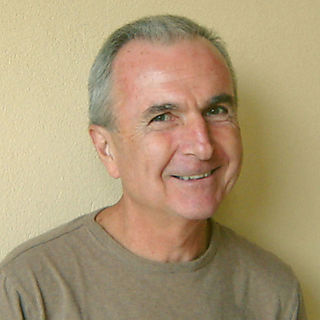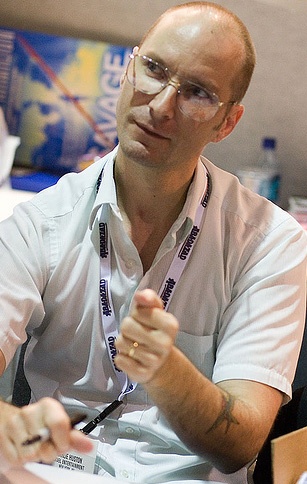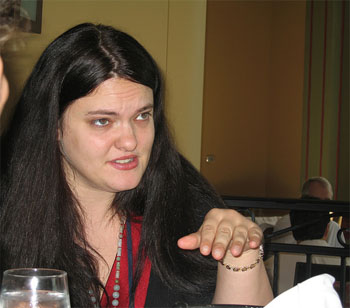Eric Kraft appeared on The Bat Segundo Show #270.
Eric Kraft is most recently the author of Flying. This is the third of a three part conversation with Kraft about all of his Peter Leroy books, an epic of more than a million words which Our Young Roving Correspondent was insane enough to read. These podcasts tie in with a roundtable discussion of Flying involving numerous people.
(To listen to Part One of this conversation, go here. To listen to Part Two of this conversation, go here.)
Condition of Mr. Segundo: Contemplating the stamina of listeners.
Author: Eric Kraft
Subjects Discussed: Writing about a location when not being at that location, intermittently returning to Babylon to absorb some details for Babbington, the limitations of revisiting place, having too many facts at one’s disposal, mysterious dark-haired girls, Peter Leroy’s muses, the gradual augmentation of swagger, seducing the audience, misheard literalisms, whether or not a meal has feelings, Boston Phoenix restaurant critic Robert Nadeau and B.W. Beath, the “warm and cuddly” label attached to Kraft’s work, perverse impulses and the telling of the tale, the source of the odd smell in Matthew’s apartment in Reservations Recommended, Kraft’s delivery of a letter to Jean Shepherd and a subsequent radio show based around that letter, dwelling more on the recent present, going to towns that have interesting names, Leroy’s influence on the memories of Kraft’s friends, efforts to make Kraft a famous writer, the effect that Random House’s purchase of Crown had on Kraft’s books, making a big score with a commercial book, dealings with Amblin, writing the Inflating a Dog screenplay, Donald M. Murray’s My Twice-Lived Life, the relationship of socks to a writer’s output, Madeline’s position on mismatched socks, self-congratulation and repetition, how to become an experienced tequila drinker, the semantics of “cult audience,” whether or not Kraft gets bags of cash in the mail, caring about an audience, the jokes that the Krafts wish they heard in bars, waiting for the dialogue to come, being in control, and the burden of holding onto scraps.
EXCERPT FROM SHOW:
 Correspondent: Has it ever occurred to you to try and make a big score in terms of writing a completely commercial book? In an effort to get people attached into the Peter Leroy universe? Or is such a thing absolutely impossible? Or did you, in fact, try to do this and it turned out to be so quirky and eccentric?
Correspondent: Has it ever occurred to you to try and make a big score in terms of writing a completely commercial book? In an effort to get people attached into the Peter Leroy universe? Or is such a thing absolutely impossible? Or did you, in fact, try to do this and it turned out to be so quirky and eccentric?
Kraft: (laughs)
Correspondent: I’m just curious.
Kraft: Where is it? I’ve forgotten which book it is.
Correspondent: Oh yeah. One of the books where there’s the publishing meeting. I think it’s the first one in Manhattan.
Kraft: It’s in Leaving Small’s Hotel, where Peter’s publishers want him to add more blood and gore to the Larry Peters series. And he can’t do it. It doesn’t work out that way. He keeps turning in quirky Larry Peters stories. And I’m much the same way. I don’t think I could possibly do it. I haven’t bothered wasting my time trying to do it. And the other way I’ve managed to shoot myself in the foot so very well is in the matter of film sales. When Herb ‘N’ Lorna was released and was reviewed on the front page of The New York Times, I got a call almost the next day from Amblin — Steven Spielberg’s company. And I spoke with people there. And we had a number of interesting conversations. And I think perhaps, in the second or third phone call, I said, “Of course, the one thing that’s of great concern to me is that, because I have plans for all of these characters, there are many, many other things I want to do with them. I would have to retain control of the characters.” There was a silence. And essentially after that, a click!
Correspondent: (laughs) Oh my god.
Kraft: It wasn’t quite like that. But it was almost like that. That the matter was at an end.
Correspondent: Wow.
Kraft: And there have been other little explorations from Hollywood and so on. And I’ve basically said the same thing. However, now that I’ve brought the characters along as far as I have, I’m ready. So…
Correspondent: Well, this makes me curious about a parallel universe in which you would open up a Happy Meal and get a piece of erotic jewelry. That would be very good for America, I think.
Kraft: I think that the marketing rights are something we’d really have to — yeah.
Correspondent: But simultaneously…
Kraft: And Leroy Lager, I think, would be launched as well. A poem on the back of each bottle.
Correspondent: Simultaneously, you did write a screenplay for Inflating a Dog.
Kraft: I did.
Correspondent: So you were actually trying to have a big score here. Or at least some sort of film out of the deal.
Kraft: Actually, that was a time when there was no work for us in educational publishing. I couldn’t find any work at all. And I had a lot of time on my hands. And I was thinking, “What can I do that might bring in some cash?” So there were two things that seemed to me like brilliant ideas. Write a screenplay based on Inflating a Dog. And approach Eli Zabar about turning the shopping experience at the Vinegar Factory into something like a treasure hunt, where I would write descriptions of the foods that would lead people from one thing to another.
Correspondent: (laughs) It would confuse them.
Kraft: An astonishing day would be Eli Zabar whizzing around town from one shop to another. But he almost liked the idea.
BSS #270: Eric Kraft, Part Three (Download MP3)
Listen: Play in new window | Download




 Huston: Sometimes, if you use the same words, you can put a little tinkle of irony into it. In the fact that you describe him doing it exactly the way the person just told him. So you use the exact same words. It’s hard for me to answer questions about the writing that are that precise. Because so much of the process is not that precise for me. So much of it is shoveling. And you’re not too terribly conscious of how you shovel while you’re doing it. Whether you’re good at it or not.
Huston: Sometimes, if you use the same words, you can put a little tinkle of irony into it. In the fact that you describe him doing it exactly the way the person just told him. So you use the exact same words. It’s hard for me to answer questions about the writing that are that precise. Because so much of the process is not that precise for me. So much of it is shoveling. And you’re not too terribly conscious of how you shovel while you’re doing it. Whether you’re good at it or not. 
 Correspondent: Which number is your favorite? Or maybe one of your five favorite numbers?
Correspondent: Which number is your favorite? Or maybe one of your five favorite numbers?